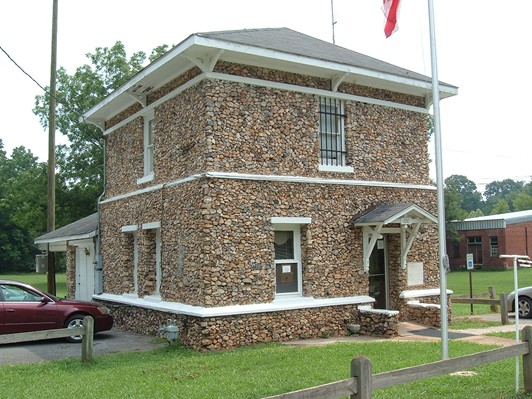|
Before Wilton received its present name around the turn
of the century it had been known by no less than seven different names since the
area was first homesteaded in the early 1800's.
Having been known primarily as a railroad town, it is
assumed the community was named after Wilton, England, which is also a railroad
center.
The first settlers, who were farmers of Scotch-Irish
descent, who came down from the Carolinas, called it Woodsborough. The spelling
was later changed to Woodsboro.
An 1856 timetable of the Alabama and Tennessee River
Railroad lists it simply as Woods. Tram lines built in 1850 enabled coal from
the mines in Aldrich to be hauled to the railroad and loaded on cars of this
time.
The town became known as Junction in 1872 which was later
changed to Birmingham Junction in 1889 when the tracks of the Selma, Rome and
Dalton Railroad and the Brierfield, Blocton and Birmingham Railroad came
through.
Shortly after this a telegraph and post office were
established and both were operated by R.O. Camp who also built the first store.
The town was next called Bismarck after the German
chancellor. During World War I the name became unpopular and Camp changed it to
Catoosa after a town in Georgia.
The first railroad to reach Wilton was the Alabama and
Tennessee River Railroad in 1853. Other lines which later came through the town
included the East Tennessee, Virginia and Georgia Railroad: Selma, Rome and
Dalton, and the 3B line all of which were finally taken over by the Southern
Railroad.
Repair shops were located here to fix engines, boilers,
etc. A long time resident of the town said he recalled seeing as many as 12-15
engines in the shop at one time. When the shop was moved to Selma, the town lost
some of its prosperity as the population declined.
One of the first homesteads in the area was located on
the property which the Cleveland family now owns. In 1818 Jonathan Ware built a
forge at Thompson's Mill, located just south of the town and it was here the
first iron in the county was made.
It is noted in one source that along with Edmund King,
who settled in Montevallo, Ware had an iron works on Shoal Creek during the
Civil War.
Wrought iron pipes were made at the mill and water pumped
through them to the nearby homes, making it the first place in the county to
have running water. The place was later owned by the Gunlock family.
Some of the early families to settle in the area were the
Camps, Mahans, Fanchers, and Wm. P. Brownes who operated the Montevallo Coal
Mines. One of the most prominent citizens was Bennett Ware who was one of the
county's first chief justices.
The town was incorporated in 1918 and the first mayor was
L. McMilian whose daughter, Mrs. Sam Vest, was postmaster for many years. The
city hall, which is still used, was built in 1934 when L. Cochran was mayor.
Councilmen at this time were: O.T. Gay, E.W. Moreland,
J.E. Milstead, B.B. Curry and A.L. Milstead. Both Curry and Gay had stores in
the community in the early 1900's. B.B. Curry operated his store from 1913-1916
when he sold it to his sister who continued to run it until two years ago.
Other stores were operated by G.H. Cosby and George L.
Ewing. A barber shop, where one resident remembers getting his hair cut as a
boy, was run by Hardy Edwards.
In addition to the Southern Railroad, the oldest
principal business, located in Wilton today is the Kimberly Clark Newsprint
office and pulpwood loading yard.
CLICK HERE
to read about Wilton's history as written in 1923 by
The Birmingham News Staff Correspondent F.W. Barnett.
 Wilton's attractive little municipal building is a
product of the work crews of the Depression.
Wilton's attractive little municipal building is a
product of the work crews of the Depression.
In the 1970's the building was
renovated, with a new police office added in back.
|
